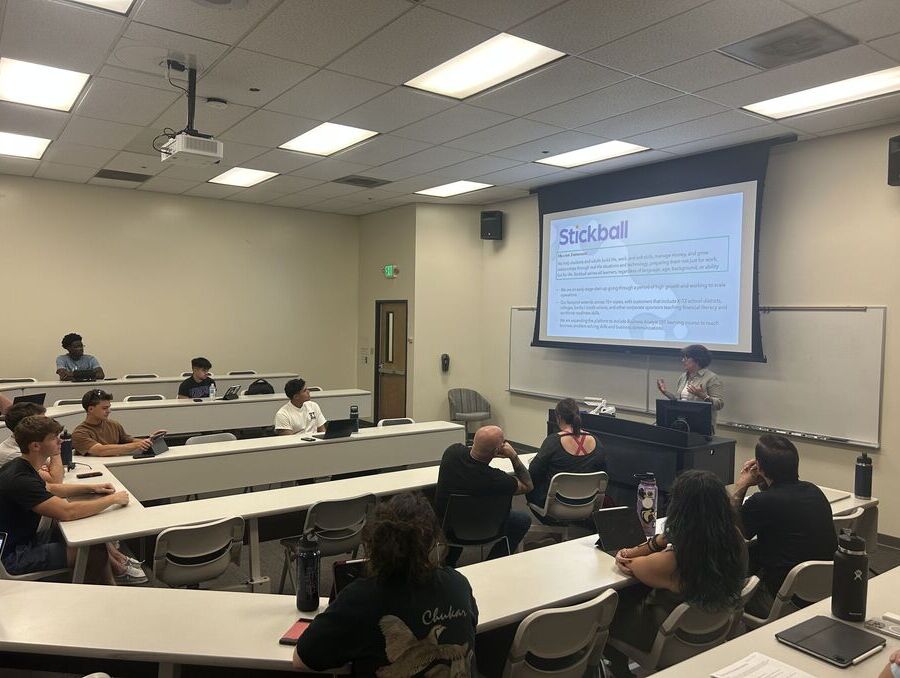
The pandemic has fueled the growth of entrepreneurship and ignited a startup frenzy. “The number of new small businesses in Nevada jumped from 140 in 2019, to 160 in in 2020, said Sam Males, state director of the Nevada Small Business Development Center. “In just the first nine months of 2021, we’ve already seen 107 new small business startups, so we’re experiencing a startup boom, despite being against the backdrop of the ongoing pandemic.”
In addition to the stresses of the pandemic, entrepreneurs are likely to experience stress as venture initiators, grappling with uncertainty and being personally responsible and liable for any decision made. Dan Jones, Ph.D., associate professor of management and Mark Packard, Ph.D., assistant professor of management in the College of Business, discuss mental health best practices for entrepreneurs and business leaders, amid National Suicide Prevention Month.
Why is it that the "fake it ‘til you make it" mantra is so prevalent? Is there a better or healthier course of action than faking it ‘til you make it?
Dr. Packard: First-time entrepreneurs can really struggle with self-confidence. There is so much to know about starting a new business, and much of it is typically learned on the fly. Of course, you don’t really want to exude your doubts and uncertainty to investors or customers, which is where the “fake it ‘til you make it” mantra comes from. But you don’t have to figure everything out by yourself. The Small Business Development Center here at the University, in the College of Business offers great support and has a network of other entrepreneurs who are also willing to help and mentor. Entrepreneurs generally love to talk shop—we’re happy to share what we’ve learned.
When there's a lot on the line, the "failure is not an option" mantra is commonly used when the going gets tough. Is there a healthier outlook when there’s a lot at risk?
Dr. Packard: Entrepreneurship is a mindset—one of discovery and creation. Failure is an option. The fear and stigma of entrepreneurial failure is a strange one to experienced entrepreneurs. Virtually all successful entrepreneurs have failed multiple times. It’s part of the process. Becoming entrepreneurial means that everything is a learning opportunity. Giving up is simply not a part of that mindset and can never be.
A key principle for entrepreneurs is to not risk more than you are willing and able to lose. Figure out what you can do, with what you can afford to lose, and no more. If you need more to do what you want, get others involved, or do something else. Shelve that idea if you have to until you are financially ready and able to move it forward. Don’t put yourself in such a situation that, if things go awry, you can’t move forward. But if you’ve found yourself in a bind, there are options. There’s a safety net. You may have to change your lifestyle, but that’s okay. It’s temporary. You can restart. Roll up your sleeves and get back at it.
How can entrepreneurs make decisive business decisions to avoid getting, or feeling trapped?
Dr. Packard: It’s true that entrepreneurial action is very uncertain, but all of life is uncertain. We deal with uncertainty all the time. In entrepreneurship, the trick is to be both decisive and indecisive at the same time. What I mean is that you have to take action and move your business forward while knowing and expecting that you’re going to have to change and adapt. Too many entrepreneurs have what they think is a great idea and don’t allow themselves to learn and adapt that idea to what their customers really need. Your business needs to adapt to become what your customers need it to be to best serve their needs. And you should always be trying to learn more about your customers, which means you should be able to keep adapting your business and its product to keep improving.
What suggestions would you give to current and aspiring entrepreneurs for maintaining mental health and well-being in the face of adversity?
Dr. Jones: Reach out to others. Research has shown time and again that a strong support network is key to avoiding mental health issues. Often, when facing adversity, individuals isolate themselves and feel that they must journey inward. While finding inner strength is great, support from others is just as important. Even if you have to get a notebook and write down who is in your support network, and in what ways they can support you, make sure you have a network of support.
Take care of yourself. Nothing is worth sacrificing your physical or mental health. Life is now, we are living now. Appreciate every day regardless of how busy you may be. Being in the moment is difficult, but critical. I’ve found that mindfulness, compassion, and trying softer are great steps to take when facing what seem to be insurmountable challenges. What I mean by “trying softer,” is not attacking everything with blasts of emotion. Instead, step back, breathe, and allow things to unfold. It is ok to fail. Many motivational speakers will tell you that you only fail when you give up chasing your dreams. Trying is better than making excuses. As Gilbert K. Chesterton said, “Anything worth doing, is worth doing badly.” Which means put it out there; better a creative mess than tidy idleness.
Dr. Packard: Life is an endless process of learning what makes us well. We’re on this same learning journey with all kinds of other people who are also trying to figure it all out. Things can happen that can set us back. But we all push forward, trying to eke out the best life possible. The beautiful thing about entrepreneurship is that we get to improve our own lives by improving the lives of others. Always keep the happiness of your customers as your end goal. By focusing on the customer, you will make their world a better place—and, as a reward, your own life will be better, financially and mentally.
National Suicide Prevention Lifeline
If you or someone you know is suicidal and in need of emergency help, dial 911 or call the National Suicide Prevention Lifeline at (800) 273-8255, or use the Lifeline Crisis Chat.
















